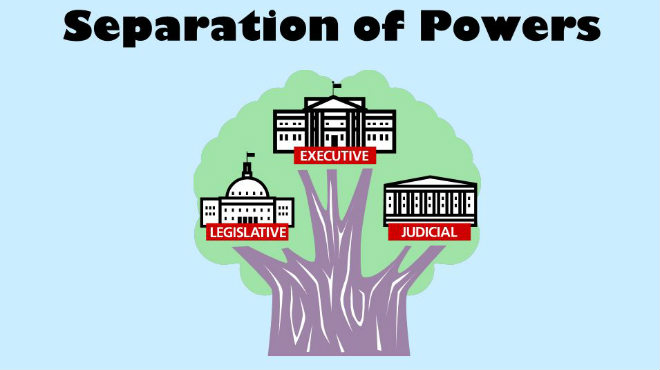
Separation of powers, in the most elementary form, connotes the division of power in a democratic government into three subdivisions: the executive, the judiciary, the legislature. The executive subsidiary is tasked with the formulation of policies for the democratic government. The legislature upholds the responsibility of granting approval to the legislation whereas the judiciary ensures the adherence of law and punishing those who infringe it.
This mechanism of separation of powers not only ensures a smoother functioning for the government by division of labour but also aids the State in ensuring that a sense of accountability exists: Legal, judicial and political accountability.
The genesis of this doctrine can be traced to the Greek philosopher, Aristotle, who cited three branches of government: the deliberative, the magisterial and the judicial. Following Aristotle, John Locke also mentioned three divisions of the government: executive, legislative and federative, in his book ‘Two Treatises on Civil Government’. However, it was the French jurist Montesquieu, who laid down the division of powers in a methodical fashion. In his book ‘The Spirit of Laws’, he asserted that it is paramount for a State to segregate its power in three branches- executive, legislature and judiciary so as to guard against the arbitrary and tyrannical action of the State. He also put forth that no individual should be a part of more than one organ of the State.
This system ensured the exercise of independent powers by each branch while simultaneously making sure that no branch authorized their power in an arbitrary manner.
The doctrine of separation of powers ensures that no organ of the government impedes the functioning of any other organ and that no one organ exercises the responsibility or the function of another organ.
The patrons of this doctrine maintain how it protects the citizens of a State from authoritarian and repressive actions of the State and at the same time acts as a safeguard for democracy. The opponents of the doctrine, however, are of the view that it leads to a decelerated governing process along with a lack of accountability.
India has a parliamentary form of government, so unlike presidential congressional system of government, the separation of powers is not exactly well defined and clear. Although the crucial functions of judiciary, executive and legislature have been adequately differentiated to ensure their proper functioning, but the doctrine has not been formally constitutionally recognized.
Each organ of the State is expected to perform their required tasks without interfering with the functioning of other organs of the government. The doctrine does not strictly operate in India. It has provided a system of checks and balances which permits the three organs to keep a watch on each other. The functions of judiciary, legislature and executive sometimes overlap, as long as it is under the limits of the constitution of India.
For instance, Article 79 makes the President a fundamental part of the parliament of India, thus making him a part of both the executive as well as the legislature. Article 61 empowers the Parliament to impeach the President. Article 85 empowers the President to dissolve the Parliament. Article 145 provides the Supreme Court with the power to lay down rules and regulations with regard to the proper functioning of the judicial functions of the courts, making it perform legislative functions. Article 136 and 137 empower the courts with judicial review, allowing them to declare the actions of both legislature and executive as unconstitutional.
Important case laws:
- M. Nagraj v. Union of India
- Ram Jawaya v. State of Punjab
- Indira Nehru Gandhi v. Raj Narayan
- Rameshwar Prasad v. Union of India
- Mansukhlal Chauhan v. State of Gujarat
Aishwarya Says:
I have always been against Glorifying Over Work and therefore, in the year 2021, I have decided to launch this campaign “Balancing Life”and talk about this wrong practice, that we have been following since last few years. I will be talking to and interviewing around 1 lakh people in the coming 2021 and publish their interview regarding their opinion on glamourising Over Work.
If you are interested in participating in the same, do let me know.
Do follow me on Facebook, Twitter Youtube and Instagram.
The copyright of this Article belongs exclusively to Ms. Aishwarya Sandeep. Reproduction of the same, without permission will amount to Copyright Infringement. Appropriate Legal Action under the Indian Laws will be taken.
If you would also like to contribute to my website, then do share your articles or poems at adv.aishwaryasandeep@gmail.com
We also have a Facebook Group Restarter Moms for Mothers or Women who would like to rejoin their careers post a career break or women who are enterpreneurs.
We are also running a series Inspirational Women from January 2021 to March 31,2021, featuring around 1000 stories about Indian Women, who changed the world. #choosetochallenge
